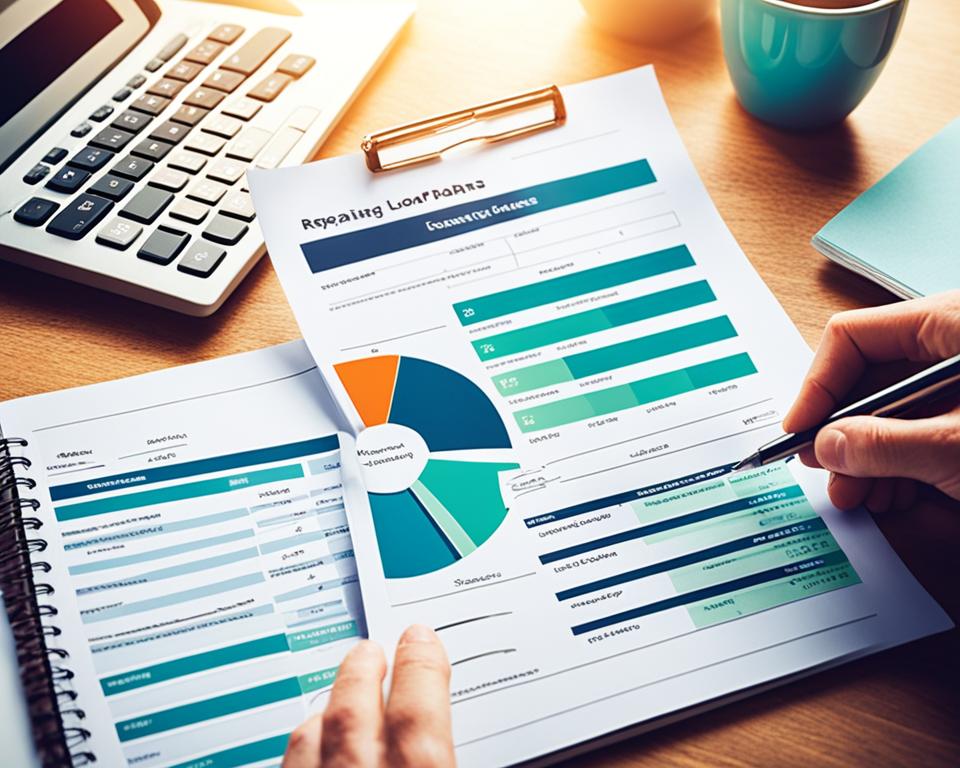As a beginner, understanding the basics of loans is essential for navigating the borrowing world. Loans can provide the necessary funds for various expenses, from buying a car to funding a college education. But where do you start? In this article, I’ll walk you through the different types of loans available, providing you with a beginner’s guide to loans and equipping you with the knowledge to make informed borrowing decisions.
Whether you’re looking for a personal loan or considering a mortgage, it’s crucial to understand the nuances of each loan type. By familiarizing yourself with the loan basics, you can confidently approach lenders and select the loan that suits your needs.
Key Takeaways:
- Loans are essential for financing various expenses and understanding their basics is crucial for beginners.
- There are several types of loans, including personal loans, debt consolidation loans, mortgage loans, home equity loans, student loans, auto loans, small business loans, credit-builder loans, and payday loans.
- Personal loans are versatile and can be used for various purposes such as debt consolidation, home improvement, or emergency expenses.
- Debt consolidation loans can help simplify monthly payments and save money on interest.
- Mortgage loans are specifically designed for financing the purchase of a home and can have fixed or variable interest rates.
Personal Loans
When it comes to financing various expenses, personal loans are a popular option for many individuals. These versatile loans can be used for a wide range of purposes, making them ideal for covering personal expenses or consolidating debt.
Personal loans are generally unsecured, which means you don’t need to provide collateral to secure the loan. This makes them accessible to a wide range of borrowers.
One of the key advantages of personal loans is that they typically come with fixed interest rates. This means that your interest rate will remain the same throughout the loan term, allowing you to budget accordingly.
It’s important to note that some lenders may charge additional fees, such as origination fees, which are typically a percentage of the loan amount. However, these fees are usually factored into the loan terms and disclosed upfront.
One common use for personal loans is debt consolidation. If you have multiple debts with different interest rates, consolidating them into a single personal loan can simplify your monthly payments and potentially save you money on interest charges.
Personal loans can also be used for various other purposes such as home improvement projects, medical bills, traveling, wedding expenses, or covering unexpected emergencies. The flexibility of personal loans makes them an attractive option for individuals seeking financing for personal use.
Debt Consolidation Loans
Debt consolidation loans are an effective solution for individuals looking to consolidate their debts into a single loan. By taking out a debt consolidation loan, borrowers can merge their multiple existing debts, such as credit card balances and personal loans, into one convenient loan with fixed interest rates. These loans are typically unsecured, meaning they do not require collateral.
The main advantage of debt consolidation loans is the ability to simplify monthly payments. Instead of managing multiple due dates and interest rates, borrowers only need to make one payment each month, making it easier to keep track of their finances. Consolidating debt can also potentially save borrowers money on interest in the long run, as fixed interest rates may be lower than the variable rates on some existing debts.
However, it’s important to consider the pros and cons of debt consolidation loans before making a decision. While debt consolidation can help pay off debt faster and improve financial management, it may not be the best solution for everyone. For instance, individuals with a poor credit history may not qualify for favorable interest rates on a debt consolidation loan.
“Debt consolidation loans provide borrowers with an opportunity to simplify their financial obligations and potentially save money on interest. However, it’s important to thoroughly assess your financial situation and use a debt consolidation calculator to determine if this is the right solution for you.”
Debt Consolidation Pros and Cons
Pros:
- Consolidate multiple debts into one loan, simplifying monthly payments
- Potential savings on interest with lower fixed interest rates
- Clear timeline for debt repayment
- May improve credit score through consistent repayment
Cons:
- May require a good credit score for favorable interest rates
- Longer repayment timeline compared to aggressively paying off individual debts
- Additional fees for origination or prepayment
- Risk of accruing more debt if spending habits are not addressed
When considering debt consolidation, it’s essential to evaluate your financial goals and circumstances. A debt consolidation calculator can help determine potential savings, monthly payments, and the overall impact on your finances. By making an informed decision, you can take control of your debt and work towards achieving long-term financial stability.
| Pros | Cons |
|---|---|
| Consolidate multiple debts into one loan | May require a good credit score for favorable interest rates |
| Potential savings on interest with lower fixed rates | Longer repayment timeline compared to paying off individual debts aggressively |
| Clear timeline for debt repayment | Additional fees for origination or prepayment |
| May improve credit score through consistent repayment | Risk of accruing more debt if spending habits are not addressed |
Before proceeding with a debt consolidation loan, take the time to explore other debt management options, such as budgeting, negotiating with creditors, or seeking credit counseling. By fully understanding the advantages and drawbacks of debt consolidation, you can confidently make a decision that aligns with your financial goals.
Mortgage Loans
When it comes to financing the purchase of a home, mortgage loans are the go-to option for most homebuyers. These long-term loans are designed specifically for real estate transactions, offering borrowers the opportunity to become homeowners.
One of the key features of mortgage loans is the ability to repay the borrowed amount over an extended period of time, usually ranging from 10 to 30 years. This allows borrowers to spread out their payments and make homeownership more affordable.
Mortgage loans can have either fixed or variable interest rates. With a fixed-rate mortgage, the interest rate remains the same throughout the loan term, providing stability and predictable monthly payments. On the other hand, variable-rate mortgages have interest rates that can fluctuate over time, exposing borrowers to potential changes in their monthly payments.
Another important aspect of mortgage loans is that they are secured by the home itself. This means that if the borrower fails to make their mortgage payments, the lender has the right to foreclose on the property to recover their investment. This security for the lender allows them to offer competitive interest rates and terms to borrowers.
There are different types of mortgage loans available to suit the needs of various homebuyers. Conventional mortgages are the most common type, typically requiring a down payment of at least 3% to 20% of the home’s purchase price. FHA loans, insured by the Federal Housing Administration, are popular among first-time homebuyers and require a smaller down payment. VA loans, guaranteed by the Department of Veterans Affairs, are available to eligible active-duty service members, veterans, and their spouses, offering favorable terms and benefits.
It is important for homebuyers to carefully consider their financial situation and goals when choosing a mortgage loan. Factors such as the loan term, interest rate, down payment, and eligibility criteria should be taken into account to make an informed decision that aligns with their needs and preferences.
Different Types of Mortgage Loans:
| Type of Mortgage Loan | Down Payment | Eligibility Criteria | Features |
|---|---|---|---|
| Conventional Mortgage | 3% – 20% of the home’s purchase price | Good credit score and income stability | Flexible loan terms and options |
| FHA Loan | 3.5% of the home’s purchase price | Lower credit score requirements | Lower down payment and easier qualification |
| VA Loan | No down payment required | Military service eligibility | No private mortgage insurance and competitive interest rates |
When considering a mortgage loan, it’s essential to explore different options, consult with mortgage professionals, and carefully review the terms and conditions to make an informed decision that best suits your financial goals and circumstances.
Home Equity Loans
Home equity loans, also known as second mortgages, are a type of loan that allows homeowners to borrow against the equity they have built in their homes. This can be a valuable financial tool for homeowners who need access to funds for various purposes.
With a home equity loan, repayment terms typically range from five to 30 years, giving borrowers flexibility in managing their loan payments. The loan amount available to borrowers is determined by the loan-to-value ratio, which is calculated based on the home’s value.
One of the key advantages of a home equity loan is that it is a secured loan, meaning it is backed by the value of the home itself. This offers lenders more security and often leads to lower interest rates compared to unsecured loans.
Home equity loans can have variable interest rates, which means that the interest rate may change over time. This can result in fluctuations in monthly payments. It’s important for borrowers to carefully consider these potential changes and evaluate their ability to afford the loan payments.
Benefits of Home Equity Loans:
- Lower interest rates compared to other types of loans
- Potential tax benefits, as the interest paid on a home equity loan may be tax-deductible (consult a tax advisor for specific advice)
- Flexible repayment terms, allowing borrowers to choose a timeframe that suits their financial situation
- Availability of larger loan amounts compared to other types of loans
Common Uses of Home Equity Loans:
- Home renovations and improvements
- Debt consolidation
- Education expenses
- Medical bills and emergencies
- Starting a business or investing in existing business ventures
Home equity loans provide homeowners with the opportunity to tap into the value they have built in their homes, offering access to funds for various financial needs. However, it’s important for borrowers to carefully consider their financial situation, evaluate the potential risks and benefits, and ensure they have a solid plan for repayment.
| Pros | Cons |
|---|---|
| Lower interest rates | Fluctuating interest rates |
| Potential tax benefits | Risk of losing the home if the loan is not repaid |
| Flexible repayment terms | Additional debt on top of an existing mortgage |
| Availability of larger loan amounts | Costs associated with loan origination and closing |

Remember, when considering a home equity loan, it’s essential to do thorough research, compare loan offers from multiple lenders, and consult with a financial advisor to ensure that it aligns with your long-term financial goals.
Student Loans
When it comes to financing a college education, student loans are a common option for many students. Whether you choose federal student loans or private student loans, these loans can provide the financial support you need to pursue your educational goals.
Let’s take a closer look at the two types of student loans:
Federal Student Loans
Federal student loans are offered by the U.S. Department of Education. These loans have several advantages, including competitive interest rates, flexible repayment options, and potential loan forgiveness. They do not require a credit check, making them accessible to a wide range of students. Federal student loans can be used to cover tuition, fees, and living expenses.
Private Student Loans
Private student loans are offered by banks, credit unions, and other private lenders. These loans have different terms and conditions compared to federal student loans. Private student loans usually require a credit check and may have variable interest rates. The loan amount and eligibility criteria may vary depending on the lender. Private student loans can also be used for tuition, fees, and living expenses.
Both federal and private student loans play a significant role in making college education accessible to students. It’s important to carefully consider the terms and conditions of each loan option and choose the one that best suits your financial needs.
Below is an image that visually represents the two types of student loans:
Now that you have a better understanding of student loans, let’s explore other types of loans that can help you achieve your financial goals.
Auto Loans
Looking to purchase a new vehicle? Auto loans provide the financing you need to make your dream car a reality. Whether it’s a car, truck, or RV, auto loans offer a convenient way to fund your vehicle purchase. These loans are typically secured by the vehicle itself, allowing lenders to offer competitive interest rates and flexible repayment terms.
When it comes to auto loans, repayment terms can vary depending on the lender and your creditworthiness. The loan term can range from 12 to 84 months, giving you the flexibility to choose a repayment schedule that suits your budget. Additionally, auto loans often come with fixed interest rates, which means your monthly payments will remain the same throughout the loan duration.
For borrowers with good credit, some lenders also offer unsecured car loans. These loans do not require collateral and can be a viable option for those looking to purchase a vehicle without using it as security. However, unsecured car loans may come with higher interest rates compared to secured auto loans.
Determining Affordability with an Auto Loan Calculator
Before you apply for an auto loan, it’s essential to determine whether the monthly payments fit within your budget. By using an auto loan calculator, you can estimate your monthly payments based on the loan amount, interest rate, and repayment term. This allows you to gauge the affordability of the loan and make an informed decision.
Auto loan calculators are user-friendly tools that provide valuable insights into your financial commitment. They help you understand how different loan amounts, interest rates, and repayment terms impact your monthly payments. By adjusting these variables, you can explore various scenarios and find the loan arrangement that best suits your financial situation.
Choosing the Right Auto Loan for You
When selecting an auto loan, it’s important to consider your financial goals and priorities. Here are a few factors to keep in mind:
- Loan Amount: Determine the amount you need to finance your vehicle purchase.
- Interest Rate: Consider whether a fixed or variable interest rate aligns with your long-term financial strategy.
- Repayment Term: Choose a loan term that allows you to comfortably manage monthly payments.
- Lender: Research different lenders and compare the rates and terms they offer.
Summary
Auto loans provide the necessary funding to make your vehicle purchase a reality. With secured loans, fixed rates, and flexible repayment terms, these loans offer a convenient way to bring your dream car home. Whether you opt for a secured or unsecured car loan, always use an auto loan calculator to estimate your monthly payments and ensure affordability. Making a well-informed decision will set you on the road to a successful and stress-free vehicle purchase.
| Benefits of Auto Loans | Considerations for Auto Loans |
|---|---|
|
|
Small Business Loans
As an entrepreneur, securing funding for your small business is crucial for its operations and growth. Small business loans are a popular financing option that can provide the necessary capital to start, expand, or maintain your business. These loans can be obtained from various sources, including banks, credit unions, and online lenders. Let’s explore the different types of small business loans and what factors lenders consider when evaluating loan applications.
Types of Small Business Loans:
There are various types of small business loans available, each catering to different financing needs. Here are some common types of small business loans:
- Working Capital Loans: These loans provide funding for day-to-day operations and expenses.
- Term Loans: Term loans offer a lump sum of money that is repaid over a specific period with regular fixed payments.
- Equipment Loans: These loans are specifically designed to finance the purchase of business equipment.
- SBA Loans: Small Business Administration (SBA) loans are government-backed loans that offer favorable terms and larger loan amounts.
Each type of loan serves a specific purpose and may have different requirements and terms. It’s important to choose the loan that aligns with your business needs and goals.
Factors Considered by Lenders:
When evaluating small business loan applications, lenders take several factors into consideration. Here are some key factors that can impact your loan approval:
- Business Credit Score: Lenders assess the creditworthiness of your business by reviewing its credit score and payment history.
- Length of Business Operation: The longevity of your business demonstrates stability and reliability, influencing lenders’ decisions.
- Cash Flow: Lenders evaluate your business’s cash flow to determine its ability to repay the loan.
- Collateral: Some loans may require collateral, such as business assets or personal guarantees, to secure the loan.
By understanding these factors, you can better prepare your business for the loan application process and increase your chances of approval.
Comparison of Small Business Loans
| Loan Type | Loan Amount | Interest Rate | Repayment Terms | Collateral Required |
|---|---|---|---|---|
| Working Capital Loans | Up to $500,000 | 6% – 20% | 3 months – 3 years | No collateral required |
| Term Loans | $25,000 – $500,000 | 4% – 30% | 1 – 5 years | Collateral may be required |
| Equipment Loans | Up to 100% of equipment value | 5% – 20% | 3 – 7 years | Equipment serves as collateral |
| SBA Loans | Up to $5 million | 4% – 13% | 5 – 25 years | Collateral may be required |
These numbers are general estimates and may vary depending on your business’s financial standing and the lender’s terms and conditions. It’s essential to compare different loan options and choose the one that best suits your business’s needs.
Securing a small business loan can provide the necessary financial resources to grow your business. Whether it’s for working capital, purchasing equipment, or expanding your operations, understanding the loan types, and meeting the lenders’ criteria are essential steps in the loan application process.
Credit-Builder Loans
Credit-builder loans are a valuable tool for individuals looking to build or improve their credit scores. These loans are specifically designed to help those with no or limited credit history establish a positive credit record. With credit-builder loans, there is typically no credit check involved, making it more accessible for individuals who have struggled to qualify for traditional loans.
One of the key features of credit-builder loans is that the loan amount is held in a secured bank account. This account acts as collateral for the loan, ensuring that the lender has a guarantee of repayment. As the borrower makes fixed monthly payments on time, their positive payment behavior is reported to the credit bureaus, contributing to the formation of a solid credit history.
By consistently making on-time payments, individuals can gradually build their credit scores, demonstrating to future lenders their trustworthiness and financial responsibility. Over time, this can open doors to better loan terms, lower interest rates, and increased borrowing options. With credit-builder loans, individuals have the opportunity to take control of their credit and pave the way towards a brighter financial future.
FAQ
What are the different types of loans available?
The different types of loans available include personal loans, debt consolidation loans, mortgage loans, home equity loans, student loans, auto loans, small business loans, credit-builder loans, and payday loans.
What is a personal loan?
A personal loan is an unsecured loan that can be used for various purposes. It has a fixed interest rate and fixed monthly payments, and it can be used for debt consolidation, home improvement projects, medical bills, traveling, wedding expenses, and emergency expenses.
How does a debt consolidation loan work?
A debt consolidation loan combines multiple existing debts into a single loan. It simplifies monthly payments, potentially saves money on interest, and helps pay off debt faster. Debt consolidation loans are typically unsecured with fixed interest rates.
What is a mortgage loan?
A mortgage loan is specifically designed for financing the purchase of a home. It has long-term repayment terms and can have fixed or variable interest rates. Different types of mortgage loans include conventional mortgages, FHA loans, and VA loans, each with their own criteria and requirements.
How does a home equity loan work?
A home equity loan, also known as a second mortgage, allows homeowners to borrow against the equity they have built in their homes. The loan amount is determined by the loan-to-value ratio based on the home’s value. Home equity loans have repayment terms ranging from five to 30 years and can have variable interest rates.
What are student loans?
Student loans are financing options for higher education. They can be obtained through the federal government or private lenders. Federal student loans offer benefits such as deferment, forbearance, forgiveness, and income-based repayment options. Private student loans have different terms and conditions, including credit checks and variable interest rates.
How do auto loans work?
Auto loans provide financing for purchasing vehicles, such as cars, trucks, and RVs. They are typically secured by the vehicle itself and have repayment terms ranging from 12 to 84 months. Auto loans can have fixed interest rates, and some lenders also offer unsecured car loans for borrowers with good credit.
What are small business loans?
Small business loans are designed to help entrepreneurs fund their business operations and growth. They can be obtained from banks, credit unions, and online lenders. Some small business loans are backed by the Small Business Administration (SBA) and can offer larger loan amounts. Lenders consider factors such as business credit score, length of business operation, cash flow, and collateral when evaluating small business loan applications.
What are credit-builder loans?
Credit-builder loans are specifically designed to help individuals with limited or no credit history establish and build credit. These loans require no credit check and involve making fixed monthly payments. The loan amount is held in a secured bank account and is accessible once the loan is fully paid off.





